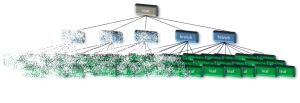Goldengate Install Error
31/07/2020 Leave a comment
Sometimes you waste much more time than you can believe because the instrumentation of the system isn’t great. If you don’t know what a system is doing, you can’t easily fix it. Time should be take to instrument your code, and ensure that any outputs from that instrumentation are readily understandable by others.
Here’s a mild frustration from this week that I encountered. I was installing Goldengate…
./runInstaller -silent -waitforcompletion -responseFile /u01/migrate/gg/software/fbo_ggs_Linux_x64_shiphome/Disk1/install_source.rsp Starting Oracle Universal Installer... Checking Temp space: must be greater than 120 MB. Actual 21571 MB Passed Checking swap space: must be greater than 150 MB. Actual 24575 MB Passed Preparing to launch Oracle Universal Installer from /tmp/OraInstall2020-07-30_08-03-36PM. Please wait ... [WARNING] [INS-08109] Unexpected error occurred while validating inputs at state 'installOptions'. CAUSE: No additional information available. ACTION: Contact Oracle Support Services or refer to the software manual. SUMMARY: - java.lang.NullPointerException
Oh my word! ACTION: Contact Oracle Support Services! java.lang.NullPointerException! Something is terribly wrong!
I’d better re-read this error message carefully… Unexpected error occurred while validating inputs at state ‘installOptions’. What? Validating inputs? Lets have a look at the inputs from the response file:
install_source.rsp ################################################################################ ## ## ## Oracle GoldenGate installation option and details ## ## ## ################################################################################ #------------------------------------------------------------------------------- # Specify the installation option. # Specify ORA19c for installing Oracle GoldenGate for Oracle Database 19c or # ORA18c for installing Oracle GoldenGate for Oracle Database 18c or # ORA12c for installing Oracle GoldenGate for Oracle Database 12c or # ORA11g for installing Oracle GoldenGate for Oracle Database 11g #------------------------------------------------------------------------------- INSTALL_OPTION=ORA11G #------------------------------------------------------------------------------- # Specify a location to install Oracle GoldenGate #------------------------------------------------------------------------------- SOFTWARE_LOCATION=/u01/gg START_MANAGER= MANAGER_PORT= DATABASE_LOCATION= INVENTORY_LOCATION= UNIX_GROUP_NAME=
I only have 2 inputs; the INSTALL_OPTION and the SOFTWARE_LOCATION… and the INSTALL_OPTION is wrong! This field is case sensitive. ORA11G does not match ORA11g, so I get a dramatic null pointer exception and a failure. It would have been a much quicker remediation if the Oracle error had been curated a little better and the programmer a little more sympathetic to users of their code.
How about:
Installation parameter INSTALL_OPTION invalid,
rather than
Unexpected error occurred while validating inputs at state ‘installOptions’
 My assumption is that the cleanup job had removed all of the extents which had been allocated before the cleanup job started. The index create statement did not notice as the current extent removal attempt blocked (hence the job error) and future to-be created extents were not affected. However, most of the index had been “cleaned up”. #sadface
My assumption is that the cleanup job had removed all of the extents which had been allocated before the cleanup job started. The index create statement did not notice as the current extent removal attempt blocked (hence the job error) and future to-be created extents were not affected. However, most of the index had been “cleaned up”. #sadface
